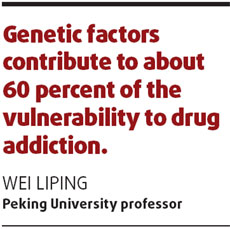Chinese scientists have found a way to track genes and biological pathways linked to drug addiction, unraveling potential ways to treat drug abuse and disorders.
"We have found 396 addiction-related genes and identified five pathways that are common to addiction to four different substances: cocaine, opium, nicotine and alcohol," the director of the center for bioinformatics of the life science college under Peking University, Wei Liping, told
China Daily yesterday.
"The research provides a more complete picture of drug addiction, as genetic factors contribute to about 60 percent of the vulnerability to drug addiction," she said.
Wei said identifying common pathways meant that treatment targeting these pathways may be more effective for a wide range of addictive disorders.
The scientists' research was based on scientific literature published in the past 30 years and 2,343 items of evidence linking genes to addiction.
Wei said her team succeeded from an integrated "systems biology approach" which is one of the first "computational system biology approaches" to studying addiction in China and the rest of the world.
"Studying individual or a small number of genes is like looking at pieces of a jigsaw puzzle. There are so many genes and signaling pathways possibly linked to addiction, but data derived from any single strategy might be biased," she said.
"Only when you gather most of the pieces from different places and arrange them together in an orderly fashion, do interesting patterns emerge."
Experts from the national laboratory of protein engineering and plant genetic engineering under the life science college launched the study in 2005, with support from the Ministry of Science and Technology.
The results of the study have also been published in the January 4, 2008 volume 4 of Plos Computational Biology, an official journal of the International Society for Computational Biology.
The journal is peer-reviewed and features works of significant computational methods.
Wei said the latest findings were an important step for developing effective treatment for drug addiction, adding that her team will continue working towards that end.
"Treatment would benefit not only the people suffering from addiction but also their relatives and friends," she said.
"However, we still have a long way to go in terms of clinical application, and we will work harder towards that."
(China Daily January 14, 2008)


